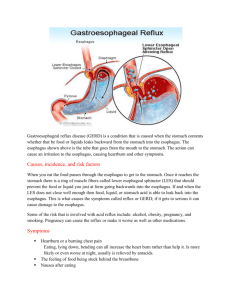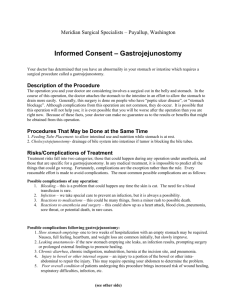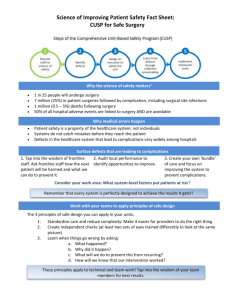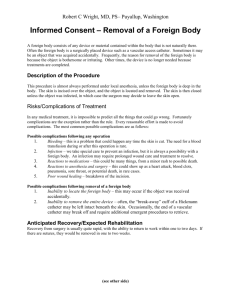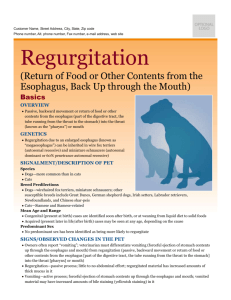Esophagectomy - robertwrightmd.com
advertisement
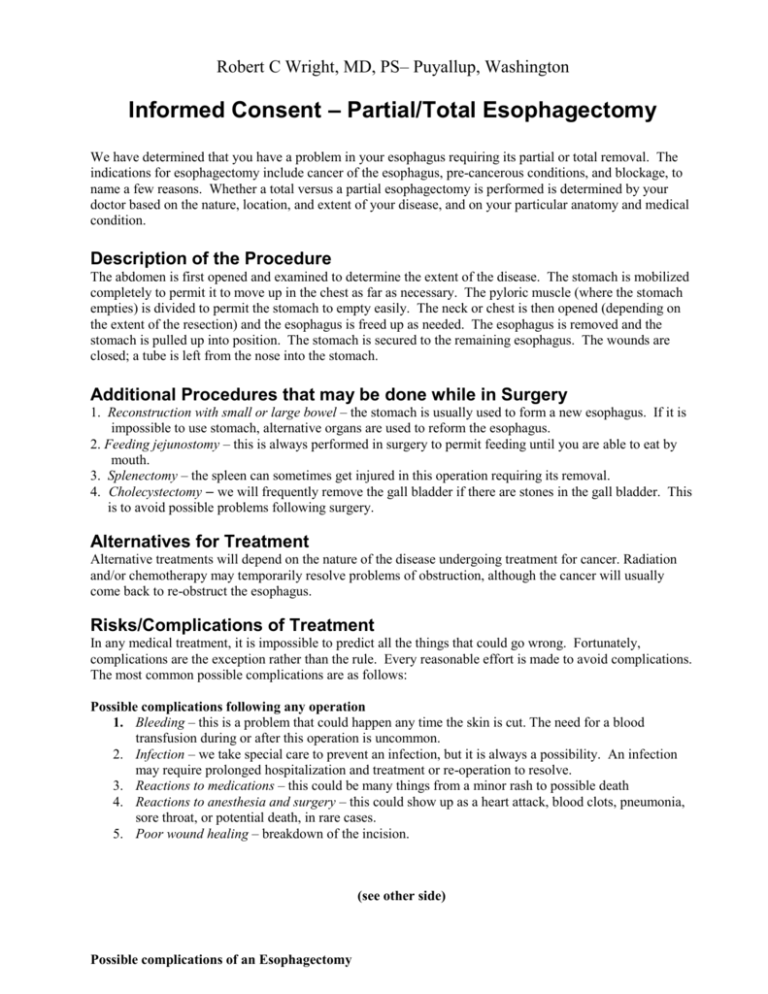
Robert C Wright, MD, PS– Puyallup, Washington Informed Consent – Partial/Total Esophagectomy We have determined that you have a problem in your esophagus requiring its partial or total removal. The indications for esophagectomy include cancer of the esophagus, pre-cancerous conditions, and blockage, to name a few reasons. Whether a total versus a partial esophagectomy is performed is determined by your doctor based on the nature, location, and extent of your disease, and on your particular anatomy and medical condition. Description of the Procedure The abdomen is first opened and examined to determine the extent of the disease. The stomach is mobilized completely to permit it to move up in the chest as far as necessary. The pyloric muscle (where the stomach empties) is divided to permit the stomach to empty easily. The neck or chest is then opened (depending on the extent of the resection) and the esophagus is freed up as needed. The esophagus is removed and the stomach is pulled up into position. The stomach is secured to the remaining esophagus. The wounds are closed; a tube is left from the nose into the stomach. Additional Procedures that may be done while in Surgery 1. Reconstruction with small or large bowel – the stomach is usually used to form a new esophagus. If it is impossible to use stomach, alternative organs are used to reform the esophagus. 2. Feeding jejunostomy – this is always performed in surgery to permit feeding until you are able to eat by mouth. 3. Splenectomy – the spleen can sometimes get injured in this operation requiring its removal. 4. Cholecystectomy – we will frequently remove the gall bladder if there are stones in the gall bladder. This is to avoid possible problems following surgery. Alternatives for Treatment Alternative treatments will depend on the nature of the disease undergoing treatment for cancer. Radiation and/or chemotherapy may temporarily resolve problems of obstruction, although the cancer will usually come back to re-obstruct the esophagus. Risks/Complications of Treatment In any medical treatment, it is impossible to predict all the things that could go wrong. Fortunately, complications are the exception rather than the rule. Every reasonable effort is made to avoid complications. The most common possible complications are as follows: Possible complications following any operation 1. Bleeding – this is a problem that could happen any time the skin is cut. The need for a blood transfusion during or after this operation is uncommon. 2. Infection – we take special care to prevent an infection, but it is always a possibility. An infection may require prolonged hospitalization and treatment or re-operation to resolve. 3. Reactions to medications – this could be many things from a minor rash to possible death 4. Reactions to anesthesia and surgery – this could show up as a heart attack, blood clots, pneumonia, sore throat, or potential death, in rare cases. 5. Poor wound healing – breakdown of the incision. (see other side) Possible complications of an Esophagectomy 1. Injury to heart/lungs/nerves – The esophagus is close to other structures in the chest and neck, and care is taken to avoid their injury. An injury to the nerves in the neck may lead to a problem talking or breathing. 2. Eating problems – swallowing is occasionally a problem following surgery that could require special attention to alternative diets, or prolonged use of the feeding jejunostomy. 3. Breakdown of the surgical repair – the area where we sew the esophagus back together may break down. The stomach (or bowel) used to reconstruct the esophagus may have a problem with its blood supply requiring additional surgery to correct. 4. Pnemothorax/hemothorax – this may require a chest tube to be placed. 5. Recurrence of the cancer – this could occur within the area of the esophagus, or elsewhere in the body. Cure cannot be guaranteed. Anticipated Recovery/Expected Rehabilitation Recovery is quite variable, depending on the individual. Hospitalization typically extends from seven to 21 days. Recovery to return to full preoperative function usually takes two or three months or more. Recovery is strongly influenced by your medical status before surgery, and the need for further treatments after surgery. Further treatment of a cancer (should you have one) may be required, including chemotherapy and possibly radiation therapy. The final pathology report after surgery will influence this decision. Consent for Treatment I understand my need for a partial/total esophagectomy. I have read and understand the above explanation of the procedure being proposed. My surgeon has answered my questions, and I choose to proceed with surgery. I understand that every operation may yield unexpected finding. I give the surgeon permission to act on his best judgment in deciding to remove or biopsy tissues that appear to be diseased, understanding that complications may arise from that action. I understand that while most people receiving an esophageal resection benefit from the operation, I may not. My condition may not improve, and it may worsen. No absolute guarantee can be made. HIPPA: Before and after surgery, unless otherwise requested in writing by you, visitors whom you invite to attend the surgery will be informed of the surgical finding, your surgical status, and anticipated recovery issues for effectiveness of communications. Because of the anesthetic, you may or may not remember these important details. PRINT NAME OF PATIENT __________________________________________________________________ SIGNATURE __________________________________________________________ DATE _________________ WITNESS ____________________________________________________________ DATE _________________ SURGEON ____________________________________________________________ DATE _________________ RELATIONSHIP TO PATIENT IF SIGNATURE OF LEGAL GUARDIAN ___________________________________ I waive the right to read this form, and do not want to be educated and informed of treatment risks; nonetheless I understand the need for this surgery and grant permission to the surgeon to proceed on my behalf. SIGNATURE _____________________________________________________ DATE _________________ 04/04revpjd
